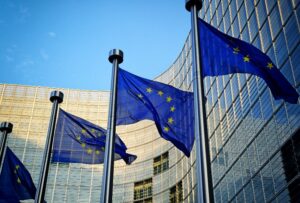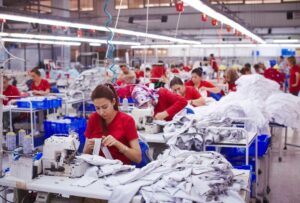On 23 February the European Commission finally published its long-awaited proposal for mandatory human rights and environmental due diligence. Here at Anti-Slavery International, we’ve been advocating for this law since 2017 and welcome this milestone as a step forward in turning our ask to a reality.
The introduction of the law has the potential to be a watershed moment in tackling forced labour in global supply chains. Globally the tide is turning in support of binding legislation on business. European countries such as France, Germany, Norway and the Netherlands have introduced, or are considering introducing, regulation on business and human rights, and there are calls for such laws by business, the public and civil society in the UK and elsewhere. These laws and proposals vary in scope and potential effectiveness.
With the EU the world’s largest single market, an EU-wide directive therefore offers the potential to set the global ‘bar’ on how current voluntary guidance on corporate respect of human rights can be made into binding law. However, the law must be designed and enforced meaningfully in order to genuinely protect workers around the world from forced labour and bring remedy and justice to survivors of forced labour.
The European Commission’s proposal has presented a strong opportunity to drive respect for people and the planet, but the gaps and loopholes must be addressed. Below we share our initial analysis of the proposal, with a focus on its potential to address forced labour. In coming weeks and months, we will publish more in-depth analysis and commentary from ourselves and partners.
Loopholes in accountability for long supply chains?

We’ve consistently been calling for the proposed law to cover entire value chains. Forced labour is often most hidden and most prevalent in “lower” tiers of supply chains, such as at raw material and material processing stages. Companies which reap their profit through sourcing of these goods cannot wash their hands of the responsibility of how workers are treated when producing them.
We welcome, therefore, that the law covers entire value chains, and includes a parent company and value chain liability regime, including over direct and indirect relationships. However, there are significant loopholes given to companies. The obligation across value chains refers to “established business relationships” – described as “lasting, in view of its intensity or duration”. This is new language – divergent from the UN Guiding Principles (UNGPs) – and opens many questions.
We are concerned that the “established” language could allow companies to evade responsibility for abuses throughout their supply chain, allowing businesses to ignore forced labour where it is harder to immediately identify in their supplier base. The focus on “established” relationships could even incentivise companies to pursue short-term contracts, instead of long-term engagement with suppliers. In many industries, fashion as an example, companies ‘jurisdiction hop’ to find the cheapest prices and often rely on excessive subcontracting, through series of short-term contracts. This is driven by companies’ unrealistic demands to suppliers on pricing and deadlines, and is often where abuses are likely to happen.
We are also concerned that companies will be able to rely on “contractual cascading” (contractual assurances with suppliers and sub-suppliers) to meet their obligation to conduct due diligence across value chains. Companies can then rely on “third-party verification” – i.e. audits and certification – to verify whether suppliers are meeting these contractual obligations, and potentially rely on this to evade liability.
The reliance on contractual cascading and audits could result in companies pushing the burden of compliance onto suppliers, ignoring the role of their own business model and strategies in driving abuses. Social audits are inadequate to address forced labour, and this limitation has been recognised by auditing companies themselves. The law must mandate companies to verify respect of human rights through credible measures, including engagement with suppliers, workers and trade unions and other affected stakeholders – not by creating further commercial demand for the auditing industry.
Only 17,000 companies: not enough accountability

Much has already been said about the proposal’s limitation to very large (500 employees or more, and €150 million revenue plus) and large EU companies (250 employees or more, and €40 million revenue plus), as well as non-EU companies within certain criteria. The Commission estimates this will cover 17,000 companies in total. For companies between 250-499 employees, the obligation is restricted to companies in the textiles, agriculture and extraction of mineral sectors.
Beyond the broader concerns about the exclusion of small and medium sized enterprises (SMEs), the list of “high-risk” is hugely limited and misses out some of the highest risk sectors for forced labour. According to the ILO, construction is the highest risk sector for forced labour, after domestic work. Other high-risk sectors, like electronics and PPE, logistics and transport, and hospitality are also missing. Quite simply, this is not enough.
Meaningful stakeholder engagement and inclusion of civil society and trade unions

Alongside our partners, we have always called for the law to require companies to meaningfully engage with affected and potential affected workers and other stakeholders. Although the proposal includes aspects of this, it is arguably one of the weakest focus areas throughout. The law must require companies to pay special attention to gender-specific needs and other groups in vulnerable situations – such as children, marginalised communities and minorities, homeworkers and migrant workers – and make sure all groups are included in stakeholder engagement processes. Stakeholder engagement must generally be mandatory throughout the human rights due diligence process, in line with the UNGPs.
The proposal’s lightly worded provision on “complaints mechanisms” is substantially more vague than international guidance on non-judicial grievance mechanisms. It risks creating a new wave of corporate-led approaches to grievance mechanisms, such as company hotlines. Such approaches lack the trust and accountability to facilitate meaningful access to remedy, in particular for workers already in heightened vulnerability. The role of trade unions must be promoted, and workers and other stakeholders must be involved in the design, implementation and monitoring of grievance mechanisms. Further, it is imperative that workers and communities raising grievances are protected from retaliation, noting that the current EU Whistleblower Directive does not cover non-EU human rights defenders.
The proposal also mentions in many places the support that companies, Member States and the European Commission should provide to SMEs and to third-country (non-EU) governments. This is welcome, but we must also see the EU place more recognition on the support which must be given to civil society organisations, trade unions, local communities and vulnerable groups in producer countries, so that they can monitor companies’ compliance and report abuses.
Moving forward: lots more to unpack

There are many more limitations elsewhere in the proposal. Barriers to justice typically faced in corporate accountability cases must still be addressed. We must see much stronger language on addressing unsustainable purchasing practices and business models. Language around disengagement must be in line with the UNGPs and OECD Guidelines for Multinational Enterprises’ principles, preventing ‘cut and run’ situations, and must include linked remedy provisions for the victims on the ground.
We will continue to call for the due diligence obligation to be linked to requirements for companies to disclose their supply chains. We also share our environmental peers’ concerns about the law’s restrictions around environmental and climate change provisions.
We will continue our advocacy over coming months and years to strengthen the proposal, working with civil society and trade unions allies, the European Parliament and supportive businesses to do so.